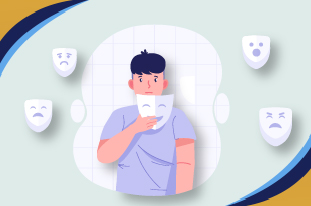Anxiety and high blood pressure are strongly associated with each other and also are a sign of each other. This means that one can cause the other and vice versa. The onset of anxiety happens due to high blood pressure and high blood pressure can be a leading reason for the manifestation of anxiety signs in a person.
If you want to learn more about the association between anxiety and high blood pressure and how these conditions can be effectively managed. Then, continue reading this blog.
Defining Anxiety Disorder
Anxiety disorder is a mental health condition that affects the mental functioning of a person. It is marked by extreme fear and dread in certain situations. A person may also experience a pounding heart and sweating.
Read More: Is Panic Disorder a Disability?
Common Signs Of Anxiety
Anxiety is characterized by the following signs:
- Feelings of fear, panic, and discomfort
- Irritability
- Obsessive thoughts
- Lack of concentration
- Restlessness
- Shortness of breath
- Dry mouth
- Nausea
- Muscle tension
- Sweaty hands
- Sleeping Issues
- Numbness
What Is High Blood Pressure?
The heart is responsible for ensuring that the right amount of blood is supplied to the arteries. To successfully perform this function a certain amount of pressure is needed for the blood to equally travel throughout the entire body via arteries. That specific force is known as blood pressure.
Moreover, blood pressure is entirely based on your activities and heart rate. For example, if a person is working out their heart rate and blood pressure and heart rate will rise. The heart rate is slower while sleeping and the blood pressure is also usually lower.
When the pressure is too high it is called high blood pressure or hypertension. According to the American Heart Association (AHA), hypertension is a blood pressure reading that is always at or above 130/80 mmHg.
Can Anxiety Disorder Cause High Blood Pressure?
Every person once in their life experiences anxiety. It is a natural body response to a stressful situation such as a student experiencing anxiety before a test or a common person waiting for important news.
Recent studies indicate that when the body releases stress hormones. These hormones specifically trigger an elevation in heart rate and narrow the blood vessels. Both of these sudden changes in the body boost the blood pressure leading to high blood pressure.
Medical evidence indicates that individuals with extreme anxiety are more susceptible than those with lower levels of anxiety. Furthermore, early detection and ongoing treatment of anxiety are usually helpful in people with hypertension.

Anxiety-induced increases in blood pressure are normally temporary and managed once the anxiety is in control. However, if a person is experiencing regular high levels of anxiety, then it is a cause of concern as it can lead to damage to the heart, kidneys, and blood vessels.
Over time, anxiety-related hormone changes can be a cause of increased fat deposits, more precisely near the abdomen. Anxiety can also trigger behavioral changes in affected people such as stress eating, which directly leads to hypertension.
Moreover, particular medications for anxiety can instantly lead to high blood pressure. Recent researches suggest that serotonin and noradrenaline reuptake inhibitors (SNRIs) that are primarily used to control anxiety disorders cause high blood pressure.
Read More: Understanding The Connection Between Male Depression And Emotional Affairs
Can Stress Cause High Blood Pressure?
Anxiety is a stress response. Stress entails the production of certain hormones such as epinephrine and cortisol. These hormones originate from the fight-or-flight response which serves to mobilize the body and prepare to either run away or fight the current danger.
Fight-or-flight hormones can be a leading factor causing an increase in the following:
- Blood pressure
- Muscular strength
- Heart rate
Once the stressful phase is over, the body systems return to normal. However, the scenario is different for people suffering from long-term stress. They experience the following signs:
- Diarrhea
- Weight Gain
- Insomnia
- Tiredness
- Unable to make choices
- Memory Issues
- More fats in the blood
- Weak immune system
- Stomach Pain
- Depression
Can High Blood Pressure Cause Anxiety?
When a person experiences high blood pressure, they also feel anxiety at the same time. A person with hypertension may have worried thoughts about their health and future.
Furthermore, the signs of hypertension can lead to panic or anxiety. Signs of hypertension include:
- Changes in eyesight
- Headaches
- Irregular heart rate
- Buzzing in the ears
Severe hypertension is a leading reason that makes a person experience anxiety. If one happens to feel severe anxiety related to signs such as headache or shortness of breath, one should rush to a doctor as soon as possible.
Anxiety symptoms are very similar to fluctuations in blood pressure and as such it is difficult to distinguish between them. Hypertension is generally taken to mark the beginning of the signs. This means that it is always a good time for a person to go to a mental health person and get his or her blood pressure taken frequently.
Treatment For Anxiety
Anxiety can be overwhelming. However, the good news is that it is curable. But, the sad fact is that only 43% of people suffering from generalized anxiety disorder undergo mental health treatment. This reduced ratio may be due to several factors such as lack of knowledge about the significance of mental health services, social discrimination based on mental state, and the associated expenses in attaining high-quality mental healthcare.
The two major common mental health treatments available for anxiety are:
Psychiatric Medications:
Managing the signs of anxiety can be challenging sometimes. Therefore, antidepressants and anti-anxiety medications are considered the first-line treatment approaches by mental health professionals. However, they tend to be effective only if taken as per the instructions and in the right proportions. Some common ones include Selective serotonin reuptake inhibitors (SSRIs), Beta-blockers, and Serotonin-norepinephrine reuptake inhibitors popularly known as SNRIs.
Psychotherapy:
Psychotherapy is often known as talk therapy. Some of the common and effective therapies include cognitive-behavioral therapy which primarily focuses on modifying negative thoughts into pleasant ones and this will eventually change the negative behaviors associated with such thoughts.
Psychotherapy and psychiatric medications are often combined for an increased effect in some cases. This is because sometimes medication is not enough to get the anxiety under control, but talk therapy can be used separately and still be effective.
Read More: Bipolar Disorder Vs ADHD: Learn The Symptoms
Treatments For Hypertension
The use of medication for hypertension is very often recommended to those individuals with this condition. However, habits including nutrition and exercise are also considered to promote people’s well-being. If the person is facing this problem either him or her or any of the family members then the first and foremost step is to consult the doctor and then you can share all your concerns with the doctor. They will help you develop a blood pressure monitoring routine along with the prescription of certain blood pressure-controlling medicines.
Last Thoughts!
In conclusion, anxiety disorder and high blood pressure are closely linked, with one condition often exacerbating the other. Anxiety can trigger temporary spikes in blood pressure due to stress hormones, while chronic high blood pressure may lead to anxiety symptoms. Left unmanaged, this cycle can pose long-term health risks. Early detection and treatment of both conditions are crucial, as managing anxiety and hypertension together can help reduce the strain on the heart and overall health. If you’re experiencing symptoms, it’s essential to seek professional guidance for proper management. Therefore, consult with our mental health experts at Orange Coast Psychiatry to attain the desired mental and physical relief.
























